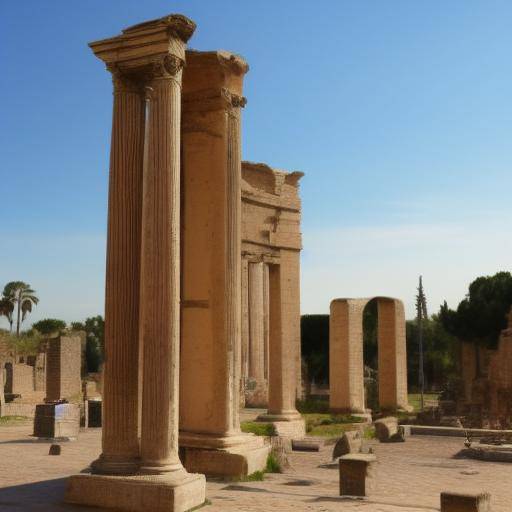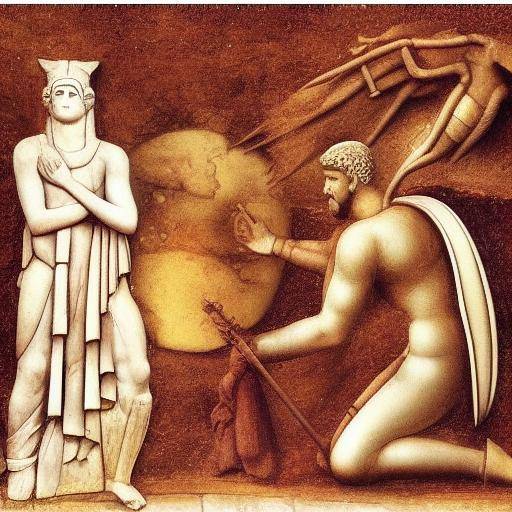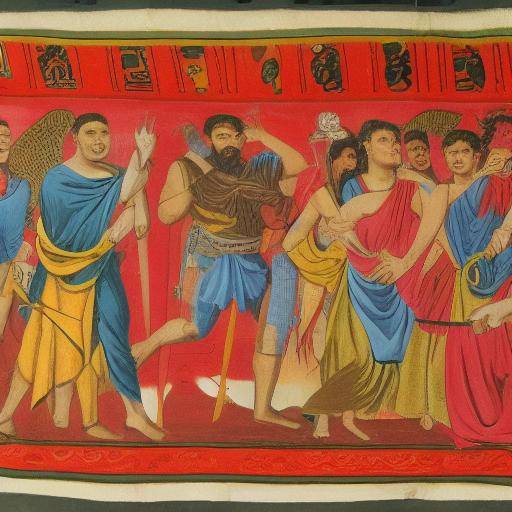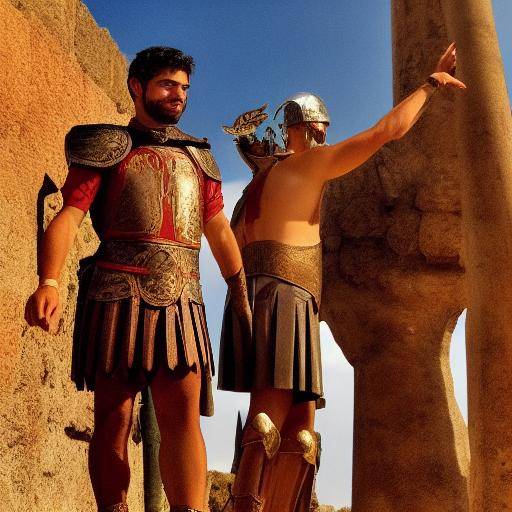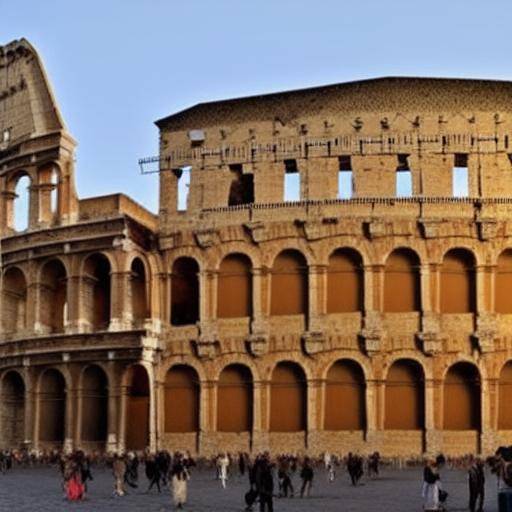
Introduction
How did the stories of the God of the Sea come about? What is the relevance of Neptune in Roman mythology? In this article, we will explore in detail the figure of Neptune, the fascinating stories of Roman mythology that surround it, and its role as the mighty God of the sea. From its origins to its impact on the current popular culture, we will travel through time and myths to discover the greatness of this enigmatic sea god.
History and Background
The Roman mythology, rich in stories and myths, presents Neptune as one of its most outstanding figures. This god, equivalent to the Greek Poseidon, was venerated as the ruler of the oceans, earthquakes and horses. It was given powers to control the marine elements, as well as the ability to generate storms and calm turbulent waters. The worship of Neptune intertwined with the daily life of the Romans, reflecting their dependence on the sea for trade, fishing and navigation.
The origin of Neptune dates back to Etruscan mythology, where he was known as Nethuns, a god of the underground waters. With Greek influence, the figure of Neptune adopted characteristics of Poseidon, becoming a powerful marine god venerated during religious festivals and celebrations. Their presence was invoked to protect the sailors and give prosperity to the fishermen. As the Roman empire expanded, the worship of Neptune spread, consolidating its position as a fundamental deity in Roman mythology.
The temples dedicated to Neptune, known as "neptunalia", were places of veneration and rituals dedicated to ensuring the fertility of the waters and the good time for navigation. This cult of the marine god reflected the deep connection of the Romans with the sea and the recognition of their influence in everyday life. Neptune's relevance in Roman mythology lasted over the centuries, even influencing Roman art, literature and architecture.
Analysis in Deep
The divine figure of Neptune transcended the religious sphere, projecting itself in Roman culture through works of art, poetry and sculptures that celebrated its might and ferocity. Mythological accounts exalted their role as an omnipotent being able to unleash storms or calm the sea according to their will. It is important to note that Neptune was widely revered as a protector and benefactor for those who depended on the sea for their livelihood and trade.
In addition, Neptune was associated with the military sphere, being invited to guarantee the victory in naval campaigns and to safeguard the safety of the ships and their crew members. This duality of divine aspects, manifesting both control over marine elements and military power, consolidated the relevance and symbolic power of Neptune in Roman society.
Comprehensive review
The comparison between Neptune and other marine gods, such as the aforementioned Poseidon, reveals similarities in their attributes and divine roles, showing significant parallels between Greek and Roman mythologies. Both are linked to the sea, exercise dominion over horses and intervene in matters related to navigation and earthquakes. This convergence illustrates the cultural and religious influence that permeated across the borders between Greece and Rome.
On the other hand, by exploring the duality of Neptune as a god of the sea and earthquakes, his role as the guardian of stability and balance in nature is revealed. The ability to provoke earthquakes symbolizes their power over the thermorial forces, adding an aspect of fear and respect for their symbolism. This duality reinforces the imposing character and, at the same time, benevolent of Neptune in Roman mythology.
Practical Tips and Accessible Recommendations
While the worship of Neptune belongs to antiquity, its legacy remains today through various cultural manifestations. The exploration of his mythology and its meaning in past societies offers a unique opportunity to understand the depth of beliefs and the influence of the gods on the life of people. Through archaeological studies, artifacts and artistic representations, it is possible to enter the world of Neptune and appreciate its relevance in human history.
The mythological accounts surrounding Neptune also offer timeless lessons on the relationship between man and nature, the importance of respecting the power of the elements and the need to honor and protect natural resources. These transcendental principles remain relevant in the modern era, reminding us of the importance of preserving the oceans and maintaining a sustainable balance with our marine environment.
Conclusion
Throughout history, Neptune has endured as an emblematic figure that encapsulates the majesty and unpredictability of the sea. Its influence extends beyond Roman mythology, transcending borders and generations to keep its essence alive in contemporary culture.
By knowing the stories of Neptune and his role as God of the sea, we immerse ourselves in a mythical universe that transcends time, connecting the past with the present through stories that continue to inspire admiration and astonishment. The figure of Neptune reminds us of the importance of honoring natural forces and preserving the greatness of the oceans, carrying with it an eternal legacy that endures in the collective memory of humanity.
Frequently asked questions
What is the difference between Neptune and Poseidon in Roman and Greek mythology, respectively?
While Neptune is the Roman equivalent of Poseidon in Greek mythology, there are significant similarities in its characteristics and domains. Both are gods of the sea, control earthquakes and are associated with horses. However, there are cultural and symbolic nuances in their representations, reflecting the adaptation of these deities to the particular needs and beliefs of each civilization.
What holidays or celebrations were dedicated to Neptune in ancient Rome?
The most relevant festival to honor Neptune in ancient Rome was the "neptunalia", which was celebrated in his honor in July. During these holidays, rituals and ceremonies were performed to invoke the protection and favor of the sea god, especially in relation to maritime security and prosperity in trade.
What impact does the figure of Neptune have on contemporary culture?
Although the formal worship of Neptune belongs to the past, its influence has been perpetuated through cultural manifestations in literature, art, music and cinema. His image as a sea god remains evoked in narrative and symbolic contexts, keeping his presence alive in the collective consciousness.
What is the importance of Neptune in marine symbolism and modern navigation?
The connection between Neptune and marine symbolism is reflected in naval traditions and customs linked to navigation. The figure of Neptune represents respect and veneration for the sea, driving rituals and ceremonies that still survive in contemporary navigation as a sign of loyalty and gratitude to the waters.
Are there archaeological discoveries related to Neptune that have revealed unknown aspects of his cult in ancient Rome?
Archaeological findings have provided important evidence of the worship of Neptune in ancient Rome, including temples, sculptures, inscriptions and votive objects. These discoveries have made it possible to better understand the rituals and practices associated with the worship of Neptune, as well as its influence on the daily life of the Romans.
How is Neptune represented in Roman art and iconography?
In Roman art, Neptune is usually represented as a mature man with a beard, wearing a mantle and holding a trident, the distinctive attribute that symbolizes his dominion over the sea. It is also accompanied by marine creatures, such as dolphins and sea horses. These visual representations emphasize their role as the sovereign of the waters and the protector of the sailors.
In short, the figure of Neptune embodies the magnificence and authority of the sea in Roman mythology, leaving an indelible mark that transcends time and geography. His legacy persists through art, literature and maritime traditions, reminding us of the depth of his influence on human culture and the eternal connection between man and the sea. With this immersion in Neptune's stories, we witness the perdurability of a god whose dominion extends beyond the waves, permeating our lives with the majesty of the ocean.



